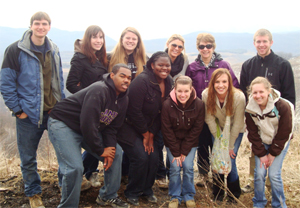JMU Students Travel to Wise County
JMU News During a spring break filled with snow days and winding van rides through hills and hollers, the nine students who spent their week serving in Wise County, Va., experienced more than a vacation.Wise County spans 400 square miles across the Appalachian Mountains in Virginia's southwestern tip, with a population of roughly 42,000 and access to healthcare that is comparable to some third world countries. One in five people live below the poverty line and as of 2008 the median household income was $32,700, about half the size of the state median.
During a spring break filled with snow days and winding van rides through hills and hollers, the nine students who spent their week serving in Wise County, Va., experienced more than a vacation.Wise County spans 400 square miles across the Appalachian Mountains in Virginia's southwestern tip, with a population of roughly 42,000 and access to healthcare that is comparable to some third world countries. One in five people live below the poverty line and as of 2008 the median household income was $32,700, about half the size of the state median.
Senior social work majors Laura Jane Steger and Brandon Rose organized and led seven students on the alternative spring break trip under the guidance of social work professor Cindy Hunter. They spent the week working with the Lonesome Pine Office on Youth and toured cultural attractions and nonprofit agencies to understand how poverty, substance abuse, environmental damage and access to social services affected different people.
"One of the core values of the social work mission is the dignity and worth of a human being," Steger said. "We talked about being aware of what stereotypes are, and the self-awareness of how you work around other cultures."
Although heavy snow interrupted some plans, the group spent an afternoon cleaning up trash along Big Stone Gap's Greenbelt Trail and washed windows at the Interstate 101 Car, a retired railroad car that now serves as a tourist information center. They also visited Mountain Empire Older Citizens, an area agency on aging, and played bingo at the Heritage Hall Healthcare and Rehabilitation Center in Big Stone Gap.
Sometimes service is being present, Hunter said.
"Everywhere we went, people were just interested that we were there and wanted to show us where they live and their culture, and that's not something I'm used to," she said. "There's a sense of place there that was meaningful."
The students attended a concert at Carter Fold in Hilton, Va. the night they arrived on March 5, and throughout the week enjoyed performances by local musicians Tyler Hughes and the Generation Gap, Ron Short and Molly Slemp. They visited historical hardware stores went and dancing, where they attempted Appalachian flatfooting.
"I didn't have a clue how to find rhythm in my feet, and everyone there had no problem with it," Steger said.
At the Black Mountain coal camp in Benham, Ky., they learned how mountaintop removal mining impacts the lives and jobs of people who live in the area, as well as the environment where pollution and runoff create "dead rivers" near the mountain. The issue is complex because Wise's economy centers on the coal mining industry, and the devastation there benefits other parts of the country.
Hunter was moved by the visit to the Harry W. Meador, Jr. Coal Museum in Big Stone Gap, Va., and their knowledgeable tour guide.
"He was exemplary to me of someone whose life has been coal mining," Hunter said. "It was about feeling the devastation of strip mining and hating the environmental impact, but then realizing your dependency on that energy and that you are making it happen."
When they visited the Appalshop, an arts and education center in Whitesburg, Ky., students viewed a documentary called "Stranger with a Camera," about the preservation of Appalachian culture.
"People come take pictures of Wise to show the poverty," Rose said. "But there's a richness there in the culture, and the people don't want to be portrayed as poor."
Although the JMU Alternative Break Program facilitated the trip, the leaders are traditionally social work students and continuance depends on the availability of willing faculty partners and trip leaders each year. Rose and Steger both had also participated in last year's trip to Wise County, and this year it was open to students of all majors.
"I'm from southwest Virginia, so I want to work in a rural location with similar access to service," Steger said. "It hit home for me in a certain sense, but opened my eyes to rural communities and the issues they face."
Rose agreed that repeated exposure made him more aware.
"It opens your eyes to more," he said. "Now that I'm back in Harrisonburg, I notice the mountains every day."

